
Jared Scott Fogle is an American former spokesman for Subway restaurants. Fogle appeared in Subway's advertising campaigns from 2000 to 2015 until an FBI investigation led to him being convicted of child sex tourism and possessing child pornography.

The Chicago "L" is the rapid transit system serving the city of Chicago and some of its surrounding suburbs in the U.S. state of Illinois. Operated by the Chicago Transit Authority (CTA), it is the fourth-largest rapid transit system in the United States in terms of total route length, at 102.8 miles (165.4 km) long as of 2014, and the third-busiest rapid transit system in the United States after the New York City Subway and the Washington Metro. As of January 2024, the "L" had 1,480 rail cars operating across eight different routes on 224.1 miles of track. CTA trains make about 1,888 trips each day servicing 146 train stations. In 2023, the system had 117,447,000 rides, or about 416,200 per weekday in the third quarter of 2024.

Anti-abortion violence is violence committed against individuals and organizations that perform abortions or provide abortion counseling. Incidents of violence have included destruction of property, including vandalism; crimes against people, including kidnapping, stalking, assault, attempted murder, and murder; and crimes affecting both people and property, as well as arson and terrorism, such as bombings.
Tre Arrow gained prominence in the U.S. state of Oregon in the late 1990s and early 2000s for his environmental activism, bid for Congress as a Pacific Green Party candidate, and then for his arrest and later conviction for committing acts of arson on cement and logging trucks. He unsuccessfully sought political asylum in Canada, and was extradited to Portland, Oregon, on February 29, 2008, to face 14 counts of arson and conspiracy. These actions were claimed as acts of protest by the Earth Liberation Front (ELF). On June 3, 2008, Arrow pleaded guilty to 2 counts of arson and was sentenced with 78 months in prison. He was released to a halfway house in 2009.
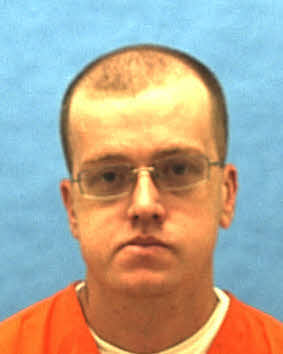
The Lords of Chaos was a self-styled teen militia formed on April 13, 1996, in Fort Myers, Florida, United States. It was led by Kevin Donald Foster. The group gained notoriety for a crime spree that ended on April 30, 1996, with the murder of one of the boys' teachers, Mark Schwebes, the Riverdale High School's band director.
William Jensen Cottrell is a former Ph.D. candidate at the California Institute of Technology who was convicted in April 2005 of conspiracy associated with the destruction of eight sport utility vehicles and a Hummer dealership in the name of the Earth Liberation Front (ELF). He was sentenced to eight years in federal prison on conspiracy charges and ordered to pay $3.5 million in restitution. He was released August 16, 2011.
Operation Backfire is a multi-agency criminal investigation, led by the Federal Bureau of Investigation (FBI), into destructive acts in the name of animal rights and environmental causes in the United States described as eco-terrorism by the FBI. The operation resulted in convictions and imprisonment of a number of people, many of whom were members of the Animal Liberation Front and Earth Liberation Front.
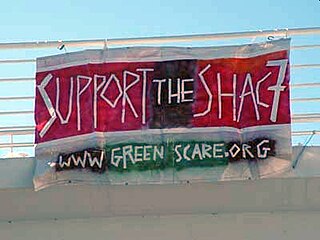
The Green Scare is legal action by the US government against the radical environmental movement, that occurred mostly in the 2000s. It alludes to the Red Scares, periods of fear over communist infiltration of US society.
Darren Todd Thurston is a former Canadian animal rights activist.
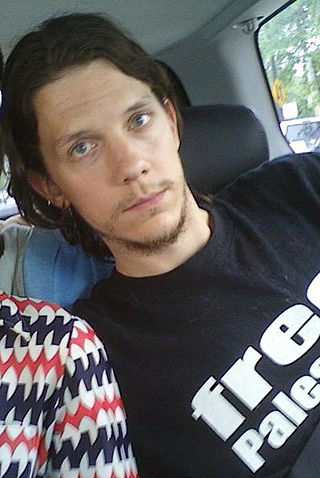
Jeremy Alexander Hammond, also known by his online moniker sup_g, is an American anarchist activist and former computer hacker from Chicago. He founded the computer security training website HackThisSite in 2003. He was first imprisoned over the Protest Warrior hack in 2005 and was later convicted of computer fraud in 2013 for hacking the private intelligence firm Stratfor and releasing data to WikiLeaks, and sentenced to 10 years in prison.
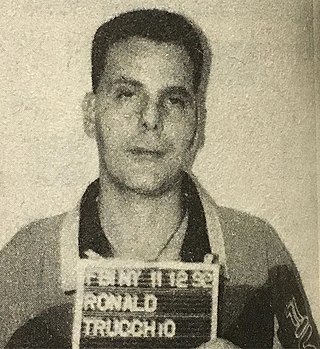
Ronald Joseph Trucchio, also known as "Ronnie One Arm" is an American mobster who rose to the position of caporegime in the Gambino crime family of New York City.

The Federal Correctional Institution, Terre Haute is a medium-security United States federal prison for male inmates in Indiana. It is part of the Federal Correctional Complex, Terre Haute and is operated by the Federal Bureau of Prisons, a division of the United States Department of Justice. The facility also has an adjacent satellite prison camp for minimum-security male offenders.
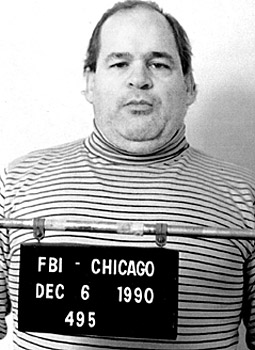
Frank James Calabrese Sr., also known as "Frankie Breeze", was a made man who ran major loansharking and illegal gambling operations for the Chicago Outfit. He is best known as a central figure in Operation Family Secrets and the subsequent federal trial. Calabrese, who was battling multiple ailments, died on Christmas Day 2012 at the Federal Medical Center, Butner, in North Carolina.
Louis Marino was an American mobster and member of the Chicago Outfit criminal organization. Marino oversaw the Outfit's rackets in Lake and McHenry counties north of Chicago. In 1993, he was sentenced to 28 years in prison for racketeering.
The University of Washington firebombing incident was an arson which took place in the early morning hours of May 21, 2001 when a firebomb was set off at Merrill Hall, a part of the University of Washington's Center for Urban Horticulture, causing an estimated $1.5 to $4.1 million in damages. By 2012 four of five accused conspirators behind the attack admitted their guilt in plea bargains. A fifth committed suicide in federal detention while awaiting trial.

The Federal Correctional Institution, Oakdale is a low-security United States federal prison for male inmates in Louisiana. It is part of the Oakdale Federal Correctional Complex (FCC) and operated by the Federal Bureau of Prisons, a division of the United States Department of Justice.
Corruption in Illinois has been a problem from the earliest history of the state. Electoral fraud in Illinois pre-dates the territory's admission to the Union in 1818. Illinois had the third most federal criminal convictions for public corruption between 1976 and 2012, behind New York and California. A study published by the University of Illinois Chicago in 2022 ranked Illinois as the second most corrupt state in the nation, with 4 out of the last 11 governors serving time in prison.

The FBI and ATF tracked 164 structure fires from arson that occurred May 27–30, 2020, during the George Floyd protests in Minneapolis–Saint Paul. Rioters started fires by igniting flammable materials within or next to buildings and in some cases by deploying Molotov cocktails. Property locations were damaged by spreading flames, heat, and smoke, and by suppressant waters from fire hoses and fire sprinkler systems. Many of the impacted structures suffered heavy damage or were destroyed, with some being reduced to piles of rubble after collapsing.











